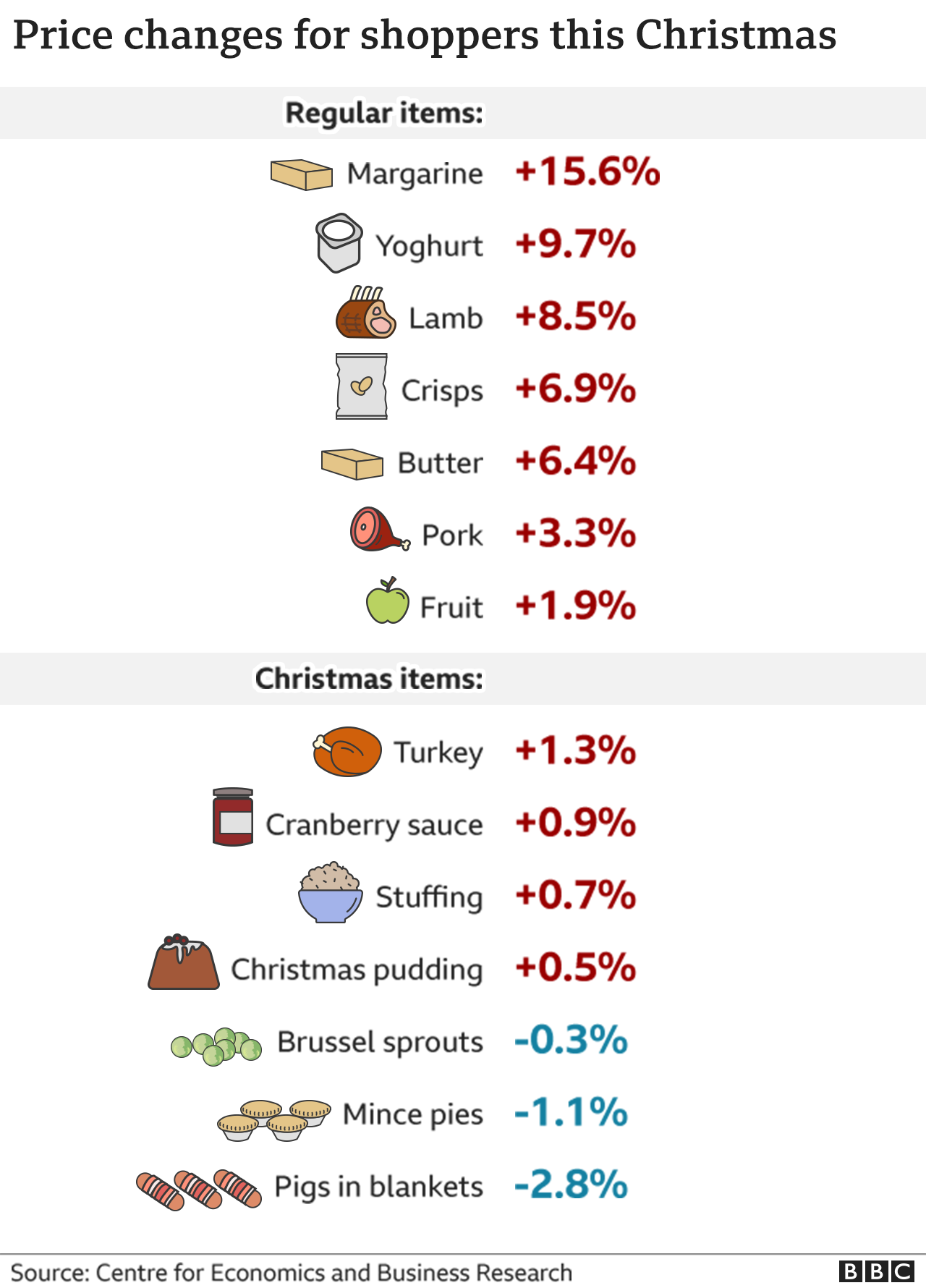

A typical UK family will spend £1,700 more per year on household costs in 2022, according to a forecast for BBC Panorama.
The analysis, conducted by the Centre for Economics and Business Research (CEBR), projected the inflation rate would rise to 4.6% by Christmas.
This rise is mainly due to higher fuel and energy prices.
Analysts say the full extent of rising costs is not yet being passed on to customers by supermarkets.
They say supermarkets are trying to keep prices constant over the festive period, even if this means absorbing some of the costs, because they don’t want to risk losing customers at their busiest time of the year.
Compared with December 2020, the typical UK family of two adults and two children is predicted to spend £33.60 more per week, due to inflation, adding up to £1,700 per year.
The forecast is based on the prices of commonly bought items, including food and drink, clothing and household goods. It also includes spending on utility bills, such as fuel and power; transport costs; and money spent on recreation and days out.
It assumes that spending patterns will remain the same as in previous years and that inflation will remain at the projected 4.6% (up from the current 4.2%). However, experts expect it could rise higher in spring 2022, putting further pressure on household spending.
Panorama and CEBR, an independent economic consultancy, also compiled data for common food products to look at the price difference between this year and last.


It showed the average cost of margarine leaping by more than 15%. Costs for dairy farms have been rising particularly strongly in recent months, according to the CEBR.
However, many common Christmas items have so far stayed at a similar price.

There are a number of reasons:
• Demand for oil and gas is pushing up energy prices worldwide
• Shortages of many goods are causing supply problems and pushing up prices
• Government support to businesses during the pandemic has largely ended
• Businesses are struggling to recruit workers. This is partly due to the pandemic, but is also compounded by Brexit, according to international policy forum the OECD

“I’ve never known things to be as challenging as they are currently,” said Andrew Selley, chief executive of Bidfoods, one of the UK’s biggest food distributors. “Whether you’re looking at people resources, product availability, everything seems to be coming together at the moment and presents us with a very challenging set of circumstances.”
The knock-on effect of the price rises is already being felt by shoppers. Nikki Rushin, a nurse from Nottinghamshire, told BBC Panorama that inflation was making her feel anxious.
“We’re certainly having to be a lot more careful,” she said. “We try and budget very carefully around food, whereas going back a couple of years, we could buy whatever we wanted to.”
She also said she and her husband, who works at a builders’ merchants, had not been able to save for Christmas for their two daughters.
“Christmas presents, Christmas dinner, everything for Christmas has to come out of the next wage packet,” said Mrs Rushin.
Like many UK shoppers, the Rushins have also noted more empty shelves in supermarkets, especially vegetables.
Richard Mowbray, the commercial director of TH Clements, one of the biggest vegetable growers, said his business had been hit by a shortage of seasonal workers from Europe.
To try to encourage more British workers to apply, TH Clements has increased wages and it expects these costs will eventually trickle down to consumers.
However, Mr Mowbray insisted it was not just labour that was pushing up costs. “It’s fertiliser, energy, oil packaging. Everything that we look at at the moment has got inflation,” he said.
The government has offered 30,000 visas for seasonal workers, but growers say that is not enough.
The government has also offered temporary visas to European lorry drivers.
A global HGV driver shortage is also forcing wages up, with some UK supermarkets now offering more than £50,000 a year.
“That’s higher wages for those people driving those trucks. That’s obviously good news for them,” said economist Torsten Bell from the independent Resolution Foundation think-tank. “But it will, in time, feed through to higher prices for everybody else.”
In October, the government said 300 EU drivers had applied for the 5,000 temporary visas. The government has declined to provide updated figures, as requested by Panorama.
The pandemic caused long delays in processing licences at the DVLA.
Panorama reporter Jane Corbin applied for a provisional HGV licence seven weeks ago. She still has not received it.
The government says provisional licences are now being issued within five working days. – bbc.com